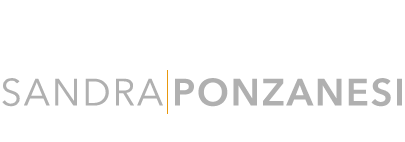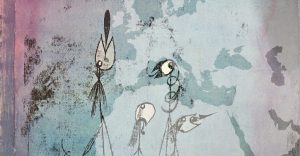CONNECTINGEUROPE ‘Digital Crossings in Europe: Gender, Diaspora and Belonging’ is a ERC consolidator project funded by the European Research Council (ERC) and granted to Prof. Sandra Ponzanesi (principal investigator).
Every year numerous migrants enter Europe legally and illegally, constructing and sustaining transnational networks through online technologies. These ‘connected migrants’ reconfigure notions of identity, gender and belonging and contribute to a new understanding as a multidirectional networked society.
Digital Crossings in Europe aims to advance a novel and comprehensive study on gendered migrant networks in Europe. Drawing from the humanities and social sciences the projects combines media and communication studies with gender and postcolonial studies, providing a qualitative approach to the emerging field of critical data studies, while also contributing to the development of postcolonial digital humanities. To this end, the project (2016-2021) will work with a mixed methodology that combines digital methods for data visualisation and network analysis in combination with virtual ethnography, in-depth interviews, photo-elicitation techniques and discourse analysis. This will make user-generated digital footprints across applications emerge as hybridised and heterogeneous forms of participation that change the way we understand and account for social inclusion, gender emancipation, intercultural identities and the idea of Europe itself.
The project aims to investigate the relation between migration and digital technologies, in particular the way in which the ‘connected migrant’ contributes to new forms of European integration and cosmopolitan citizenship. Digital Crossings in Europe explores digital diasporas in relation to issues of gender, ethnicity and affective belonging, focusing on how new technologies enhance new forms of connectivity between the homeland and destination countries, bus also across diasporas. The project pioneers a new interdisciplinary method that combines media studies, postcolonial theories, digital humanities and gender studies, drawing from the humanities and social science.
It proposes a comparative approach, based on qualitative digital methods, that focuses on Somali, Romanian and Turkish women migrants who have settled in some of Europe’s main cities (London – PhD1, Amsterdam – PhD2 and Rome – PhD3) and the way in which they keep digitally and emotionally connected to their homeland cities (Mogadishu, Bucharest, Istanbul – Postdoc). The project will chart how different forms of migration (labour, postcolonial and postsocialist) impact on the new European order at the local and transnational levels.
An overview of all CONNECTINGEUROPE publications can be found here.
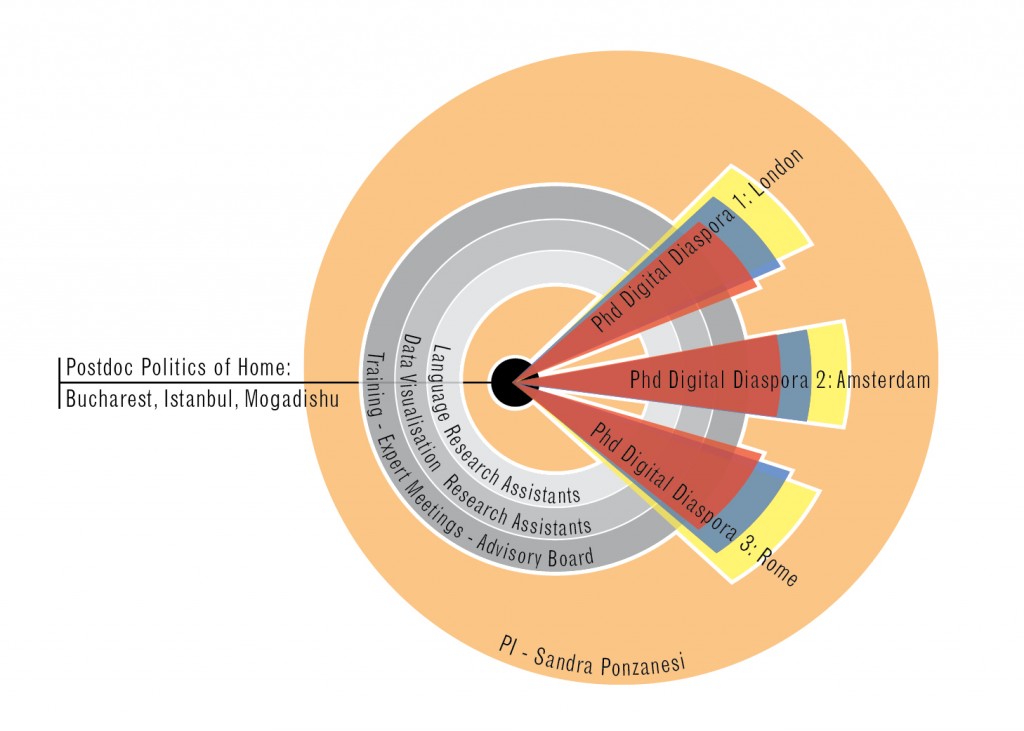
………………………………………………………………………………………………………………………………………………………………
Conference – Migrant Belongings: Digital Practices and the Everyday (21-22-23 April 2021)
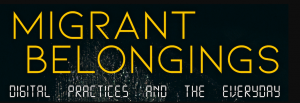
The international conference Migrant Belongings: Digital Practices and the Everyday took place on 21, 22, and 23 April 2021. Conveners of the conference were prof. Sandra Ponzanesi and dr. Koen Leurs. Keynote speakers included prof. Engin Isin, prof. Nicholas de Genova, prof. Larissa Hjorth, prof. Paul Gilroy and prof. Saskia Witteborn.
Migrant belonging through digital connectivity refers to a way of being in the world that cuts across national borders, shaping new forms of diasporic affiliations and transnational intimacy. This happens in ways that are different from the ways enabled by the communication technologies of the past. Scholarly attention has intensified around the question of how various new technical affordances of platforms and apps are shaping the transnationally connected, and locally situated, social worlds in which migrants live their everyday lives.
This international conference focused on the connection between the media and migration from different disciplinary vantage points. Connecting with friends, peers and family, sharing memories and personally identifying information, navigating spaces and reshaping the local and the global in the process is but one side of the coin of migrant-related technology use: this Janus-faced development also subjects individual as well as groups to increased datafied migration management, algorithmic control and biometric classification as well as forms of transnational authoritarianism and networked repression.
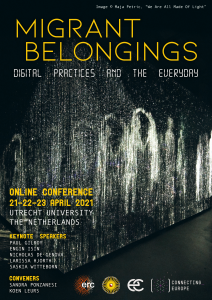 This conference payed particular attention to the everyday use of digital media for the support of transnational lives, emotional bonds and cosmopolitan affiliations, focusing also on the the role digital media play in shaping local/urban and national diasporic formations. This is because it becomes increasingly important to give everyday digital media usage a central role in investigations of transnational belonging, digital intimacy, diasporic community (re)production, migrant subject formation, long-distance political participation, urban social integration and local/national self-organization.
This conference payed particular attention to the everyday use of digital media for the support of transnational lives, emotional bonds and cosmopolitan affiliations, focusing also on the the role digital media play in shaping local/urban and national diasporic formations. This is because it becomes increasingly important to give everyday digital media usage a central role in investigations of transnational belonging, digital intimacy, diasporic community (re)production, migrant subject formation, long-distance political participation, urban social integration and local/national self-organization.
Therefore we need to examine individual and collective user practices within the wider historical and cultural contexts of media studies, cultural studies and postcolonial cultural studies scholarship, attuned to issues of politics and power, identity, geographies and the everyday. This also creates new challenges for cross-disciplinary dialogues that require an integration of ethnography with digital methods and critical data studies in order to look at the formation of identity and experience, representation, community building, and creating spaces of belongingness.
For the full program, see here. The recordings of the keynotes and other sessions are available here.
………………………………………………………………………………………………………………………………………………………………
Host Institution
Utrecht University is one of Europe’s leading research universities, recognised internationally for its high quality and innovative approach to both research and teaching. Founded in 1636, the University has always focused strongly on research. Owing to its solid grounding in discipline-based scholarship, Utrecht University is at the forefront of developments in interdisciplinary knowledge. The University participates in various thematic multidisciplinary collaborations that conduct excellent research. With its prominence in teaching and research, Utrecht University works towards finding solutions of the highest possible impact and significance to the major challenges facing the 21st century.
The Faculty of Humanities has around 7,000 students and 900 staff members. With its research and education in these fields, the Faculty aims to contribute to a better understanding of the Netherlands and Europe in a rapidly changing social and cultural context. The enthusiastic and highly motivated colleagues and the excellent facilities in the historic city centre of Utrecht, where the Faculty is located, provide a stimulating professional atmosphere.
Department of Media and Culture Studies
The Department of Media and Culture Studies provides education on and carries out research in the fields of film, television, games, new media and digital culture, theatre, dance and performance, gender and ethnicity, music and cultural policies. Culture is a dynamic mix of artistic, creative and everyday practices with which people shape their identities and actions, and within which societal structures and institutions take shape. Media (old and new) are crucial factors in these processes.
The department is the home base for all the lecturers who teach in the Bachelor’s programmes Media en Cultuur and Muziekwetenschap. They also teach in the various Master’s programmes, including Film- en Televisiewetenschap, Muziekwetenschap and Kunstbeleid- en management and the English-language programmes Gender Studies,Gender and Ethnicity, Media and Performance Studies, Musicology, New Media & Digital Culture, and Theatre Studies.
The scholars in media and culture studies from the various research groups often work together to explore issues surrounding different facets of the role played by art, culture, and media in present-day society. The research focuses on a broad range of media and cultural and artistic performances, which are studied within their intermedial context. We pay particular attention to the relation between historical and contemporary developments, transmedial and intermedial phenomena, cultural diversity, emancipation, heritage and the digital humanities.
Institute for Cultural Inquiry (ICON)
The Institute for Cultural Inquiry (ICON) is one of the four research institutes of the Faculty of Humanities. The researchers from the departments of History and Art History, Languages, Literature and Communication and Media and Culture Studies who belong to ICON are organised in the research groups Gender Studies, Literature, Media and Performance, Medieval Culture and Musicology.
ICON scholars are also members of national research schools and are active in numerous international partnerships and networks in their various disciplines. Collaboration with other partners within society is also a key priority for ICON.
Gender and Diversity Hub
The Gender and Diversity Hub of Utrecht University joins forces with societal partners to solve complex gender and diversity issues, as well as to develop strategies for implementing diversity in order to achieve societal inclusion and change. The Gender and Diversity Hub is part of research expertise area Institutions for Open Societies.
Graduate Gender Programme (GGeP)
The Netherlands Research School of Gender Studies (NOG) at Utrecht University (The Netherlands) provides a platform for gender sensitive and postcolonial research. Since 1995, the NOG has offered a highly successful training programme and research environment for postgraduate students, PhD students and senior researchers. The NOG teaching and research staff consists of an international team of professors and senior lecturers from various universities.
The NOG is a top European programme and plays a central role in European cooperation on research and training in the area of Gender and Postcolonial studies.
For more information see the CONNECTINGEUROPE website. An overview of CONNECTINGEUROPE’s most recent news and events can be found here.
An overview of all CONNECTINGEUROPE’s publications is available here.
